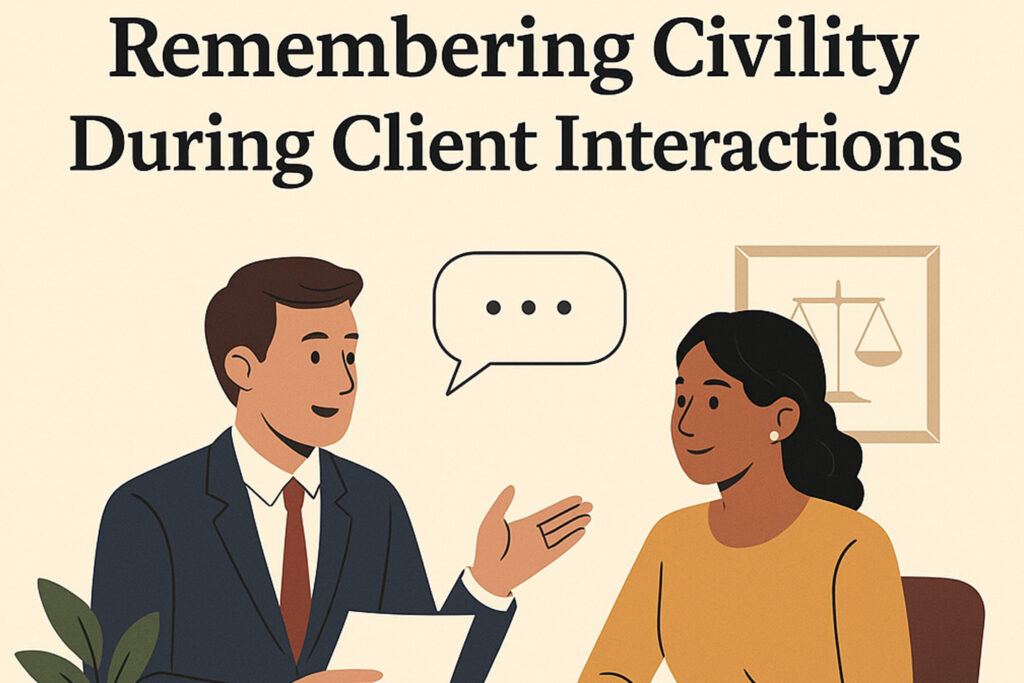
In personal injury law, our clients come to us during some of the most traumatic and life-altering moments of their lives. Whether they’ve suffered a debilitating injury or lost a loved one, they are navigating unfamiliar terrain, burdened by grief, pain, and uncertainty. As their legal advocates, it is not only our responsibility to fight for justice—it is also our duty to treat them with empathy, patience, and respect.
At the heart of this duty lies a principle that should never be forgotten: civility.
Understanding the Emotional Toll of Litigation
For most clients, litigation is a foreign process filled with complex legal language, endless paperwork, and high-stress situations like depositions and trial. On top of that, they may be coping with physical pain, financial pressure, or the emotional devastation of losing a loved one.
As attorneys, we must remember that our familiarity with litigation does not lessen the overwhelming nature of the process for our clients. Patience and understanding are not just professional courtesies—they are necessities.
Preparing Clients for Depositions: Civility in Action
Depositions are often the most intimidating part of the process for clients. It is our job to prepare them not only for the substance of the questions but for the demeanor required during testimony.
Key reminders for clients:
- Remain calm and avoid emotional reactions, even if questions seem unfair or accusatory.
- Never argue with opposing counsel.
- Avoid sarcasm, flippant remarks, or defensive body language.
- Answer clearly and truthfully, without speculation or exaggeration.
The goal is to present your client as credible, composed, and respectful—qualities that will resonate positively with opposing counsel, judges, and ultimately, jurors. Remaining calm and respectful goes a long way towards securing a fair settlement and avoiding trial.
Respecting Medical Professionals and Experts
Clients must also understand the importance of maintaining respectful interactions with treating physicians, medical experts, and independent examiners. Even when clients are frustrated or confused, their tone and conduct matter.
Why civility matters here:
- Experts may be called to testify about their interactions with your client.
- Disrespectful behavior can be noted in medical records or depositions.
- Professional demeanor builds trust and credibility with key witnesses.
Help your clients understand that these experts are part of the process—and that their cooperation can significantly impact the success of the case.
Civility in the Courtroom: Conduct During Trial
When your client appears in court, their behavior is on full display. Jurors, judges, courtroom staff, and even opposing counsel will be watching closely.
Clients should be instructed to:
- Dress appropriately and arrive on time.
- Show respect to judges, clerks, bailiffs, and opposing parties.
- Avoid emotional outbursts, facial expressions, or gestures that can be perceived as disrespectful.
- Listen attentively and speak with clarity and composure when called to testify.
- Don’t be an advocate by passing notes or frequently conferring with the lawyer in front of the jury. It is the lawyer’s job to advocate.
Courtroom civility reinforces your client’s credibility and reflects positively on your case.
The Lawyer’s Role: Patience as a Professional Virtue
It’s easy to forget how overwhelming this process is for someone outside the legal profession. Clients may ask the same question multiple times, forget details, or become emotional. These are not signs of disrespect—they are signs of stress, grief, or trauma.
As attorneys, we must:
- Remain patient, even when clients are confused or emotional.
- Provide reassurance, not frustration.
- Be educators, explaining each step with clarity and empathy.
- Recognize trauma, and adjust our tone and expectations accordingly.
- Respond timely, when contacted by a client with questions throughout the case.
Remember, we are not just litigators—we are human guides through a difficult journey.
Grief and Trauma: The Human Side of Injury and Loss
Many personal injury and wrongful death clients are suffering from more than physical harm. The emotional toll of an unexpected injury, permanent disability, or tragic loss can be immense. It’s important to remember:
- Clients may be experiencing depression, PTSD, or acute grief.
- Their ability to process legal instructions may be impaired.
- Civility and compassion can make all the difference in their healing and cooperation.
By practicing civility in our interactions, we foster trust and promote healing—essential elements of a successful attorney-client relationship.
Conclusion: Why Civility Matters More Than Ever
Civility is not a sign of weakness. It is a hallmark of professionalism and an essential element of effective advocacy. By preparing clients to act with civility—and by modeling it ourselves—we elevate the standard of representation and contribute to a more respectful, humane justice system.
Eric has spent more than 35 years committing to treating his clients with the dignity they deserve, and teaching them to do the same as they walk through the legal process. In a field defined by human suffering, civility is not optional—it is our compass.

